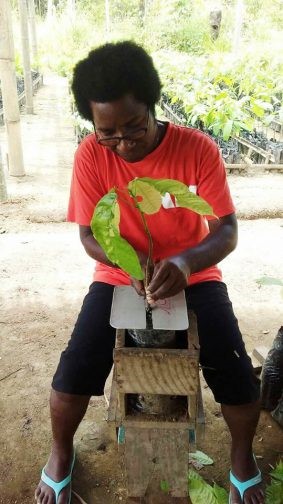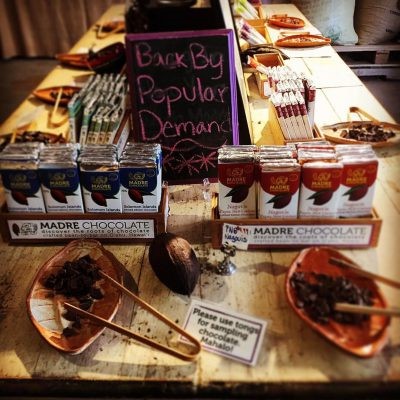For more than 10 years, Grace Klembasa toiled away on cocoa farms in Aitape, West Sepik Province in Papua New Guinea. With young twin daughters to support, the single mother devoted herself to a life of hardwork; a chapter that is now yielding rewards beyond her imagination.
Grace’s journey to success began with a sample of dried cocoa beans she entered for the PNG Warwagira, the country’s first Cocoa of Excellence Show that was held in Kokopo in May 2017. She made headlines when she grabbed gold at the show after international judges ruled her sample the best among 18 finalists and almost 100 cocoa samples.
A year later, bars of single-origin 70% dark chocolate made from cocoa beans supplied by Grace from Aitape can be spotted among a display of chocolates by the renowned and award-winning Madre Chocolate in Honolulu, Hawaii in the US. Also in the display are the Nagovis bars made from beans sourced from Nagovis in Bougainville.
Award-winning beans and chocolate
It’s not often you find chocolate bars made from PNG cocoa on store shelves overseas, especially in the US, but when you do, it’s a moment of undeniable pride. Knowing how far that cocoa has travelled – from a remote district with the logistic challenges of getting crops to markets, let alone international markets; the effort to produce quality cocoa without smoke taint; and understanding the constraints faced by smallholders – is enough to have any Papua New Guinean feeling overwhelmed.

It was at the Cocoa Warwagira that Madre Chocolate co-owner and flavourmeister Dr Nat Bletter was introduced to Grace and the cocoa he now uses for the Aitape 70% chocolate bar. He described the cocoa as “fruity with the underlying hazelnut flavour of the PNG cacao”. Madre Chocolate has won 26 international, US and Hawaiian chocolate awards. The company carries a wide range of single-origin chocolate from around the world and continues to inspire and educate customers to appreciate the rich cultural heritage and ecological diversity surrounding cocoa.
Martin Christy from the International Chocolate Awards who was head juror on the judging panel during the Cocoa Warwagira said PNG cocoa had the potential to compete with the best in the world given its great flavours. He said consistent quality would allow PNG to sell cocoa into high-end or specialty markets.
Both Dr Bletter and Mr Christy had travelled to PNG as judges for the Cocoa Warwagira that was hosted by the Cocoa Board of PNG and the Pacific Horticultural and Agricultural Market Access (PHAMA) Program, an Australian-funded aid-for-trade program that also has offices in Fiji, Samoa, Solomon Islands, Tonga and Vanuatu.
Developing the specialty market
Cocoa is a K300 million industry in PNG. It supports more than 150,000 households and provides income for at least 20% of the population who are smallholder farmers.
While the majority of PNG’s export cocoa is sold to the Asian bulk market, significant effort has been made to develop exports of PNG cocoa to specialty markets. These efforts began with the establishment of the Cocoa Industry Working Group – initiated by PHAMA – that encouraged stakeholders from the public and private sectors to work together to advance cocoa exports to specialty markets. The group comprises cocoa growers, processors and traders, as well as representatives from government and regulatory agencies such as the PNG Cocoa Board.

PHAMA has played a significant role in initiating and facilitating interventions to develop access for cocoa to the specialty market. These interventions include:
- Conducting the Cocoa Cooperatives Baseline Survey to determine the product capacity of smallholder cocoa producers;
- Conducting a cocoa market study to analyse and establish the market potential;
- Organising trade visits and cocoa festivals, and sending cocoa samples abroad as a way of linking producers to international buyers;
- Building the capacity of local cocoa producers through training and provision of solar dryers and monitoring equipment to improve cocoa quality to meet market requirements; and
- Building the capacity of government and regulatory agency representatives to discuss and negotiate policy and legislation changes for the industry.
The baseline survey collected data on cocoa production, processing and export capacity while the Cocoa Market Study identified barriers hindering entry to the specialty market. The market study revealed that while there is great interest in PNG cocoa, logistics and quality issues including the lack of capacity among producer groups to export, specialty buyers’ reservations about entering the PNG market, government regulations and the smoke taint in cocoa were among key challenges affecting export to specialty markets.
The market study revealed projects like PHAMA and the World Bank’s Productive Partnerships in Agriculture Project have a significant impact on growing the industry and exports to specialty markets, and offer great benefits to farmers.
PHAMA organised and funded trade visits where international buyers from the UK, Belgium, France and the US visited plantations, processors, exporters, freight agents, industry bodies and stakeholders across PNG. The interactions of international buyers with local industry stakeholders highlighted the need for PNG to meet international trade requirements if it was to access specialty markets. These requirements included the need to improve cocoa quality, enter into contractual terms, establish traceability, insurance arbitration, and determine shipping options.
The PHAMA-supported trade visits have since helped to raise the profile of PNG cocoa and resulted in trade deals between PNG cocoa producers and buyers from Europe and the US.
Influencing change
PHAMA PNG Country Manager Sidney Suma said PHAMA would continue working with the PNG cocoa industry to supply cocoa into better priced markets by helping growers meet quality and certification requirements.
Cocoa Board Economics Manager Claire Parik said PHAMA’s work had helped the board’s understanding of international requirements of specialty markets as well as the gaps in linking farmers to specialty markets. She said they were now in a better position to negotiate changes to regulation at management level.
The PNG Cocoa Board has started to review regulations on cocoa exports for smaller quantities to specialty markets. Ms Parik said, “With support from PHAMA we believe our export market volumes to specialty markets will increase in the near future.
Back in West Sepik Province, the hardworking Grace is nurturing a new generation of cocoa farmers in Aitape. Through a nursery she set up, she has shared 5,000 cocoa plants among 15 youth who are now setting up their own cocoa farms. Reflecting on her journey, specifically how the cocoa she supplies is now used to make chocolate bars that are being sold in the US, she said, “I’m humbled. It’s a big achievement and I acknowledge the good Lord who has helped me and brought me this far.”
For further information, contact Sidney Suma at s.suma@phama.biz or on +675 7640 3290
